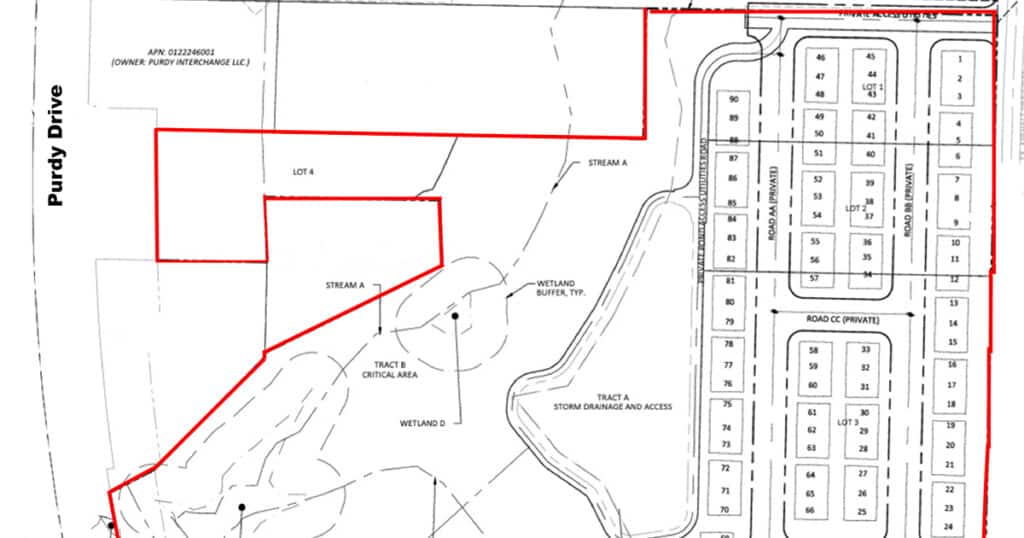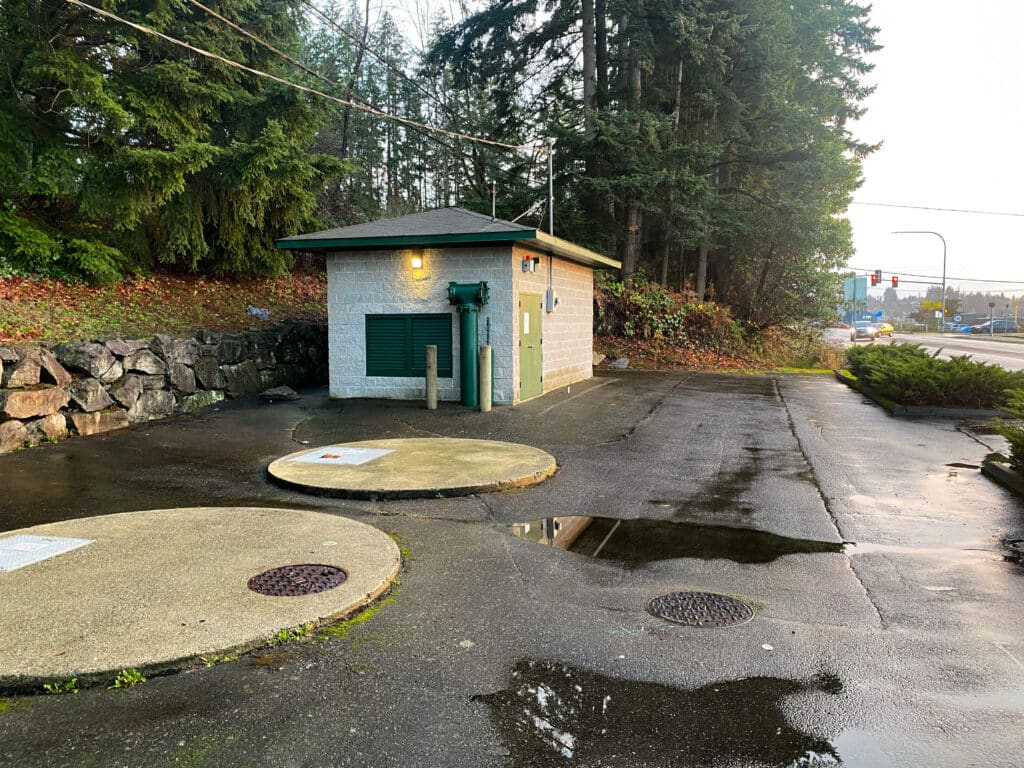Business Community Government
County erred in removing Purdy from urban growth area, state’s Growth Management Hearings Board rules
Pierce County’s removal of Purdy from the city of Gig Harbor’s urban growth area (UGA) in a Pierce County Comprehensive Plan update passed late last year was “clearly erroneous” because it failed to concentrate urban growth within a UGA, the state’s Growth Management Hearings Board ruled on Tuesday.
The board also ruled that the removal was not consistent with the county’s definition of rural or with the treatment of rural areas called for under the plan
“In retracting Purdy from the UGA, the County failed to account for the reality that Purdy’s built environment is characterized by urban growth, not rural development,” the board’s Final Decision and Order in the case of Purdy Interchange, LLC v. Pierce County and City of Gig Harbor, Intervenor stated.
Back to Pierce County
In its decision, the board remanded the question of whether Purdy belongs in the UGA back to Pierce County. The county must either drop the effort to reclassify Purdy as rural or come up with a justification for Purdy’s UGA retraction that is acceptable to the board.
A Compliance Hearing, scheduled for April 20, 2026, will determine whether the county’s proposed corrective action is acceptable to the board.
The decision gives a boost to Rush Companies’ effort to build 90 housing units (30 triplexes) on 18.64 acres of land just west of Purdy Elementary School. Rush owns or controls Purdy Interchange LLC, the owner of most of the land slated for the project, and petitioner in the Growth Management Hearings Board case.

Taken from a sewer report Rush Companies submitted to Pierce County, this image shows the 7.5 acres where Rush Companies hopes to build 30 triplexes within the overall 18.64 acre project site. It also shows a planned stormwater detention facility as well as streams and wetlands that are within the larger site.
Pierce County began discussing the possibility of stripping Purdy of its UGA status at least as early as January 2024, as part of a countywide effort to shed surplus UGA lands in the GMA-mandated comp plan update last year. The city of Gig Harbor supported removing Purdy from its urban growth area.
As the largest private landowner in Purdy, Rush opposed the move, which would result in a downzone of its property. Rush sought to lock in its ability to create the triplexes by completing its development application before the county finalized its comp plan update.
The company’s goal was to vest the project’s development rights in pre-existing Mixed Use Dwelling (MUD) zoning, which allows up to 15 housing units per acre as well as some commercial and other non-residential uses.
City denies access to sewer system
However, Rush’s plans hit another roadblock on Jan. 17, when the city of Gig Harbor informed the developer that it would not connect the planned development to the city’s sewer system.
Gig Harbor Public Works Director Jeff Langhelm’s letter to Rush cited state law that cities should extend sewer and water services outside their urban growth areas only in “limited circumstances shown to be necessary to protect basic public health and safety and the environment, and when such services are financially supportable at rural densities and do not permit urban development.”

The Gig Harbor sewer system’s Lift Station 13, which sits on Purdy Drive, adjacent to a Rush-owned property. In its lawsuit, Rush argues that the station has more than enough capacity to service its proposed multi-family housing development west of Purdy Elementary school.
Rush responded with legal action on two fronts. It sued Gig Harbor in Pierce County Superior Court, seeking to compel the city to provide a city sewer connection for its triplexes. In the suit, it argued that “the ordinance removing the area from the UGA has not gone into effect. The project is vested to the urban zoning and necessary supporting urban services available at the time of the complete application.”
“The City is required to review the project as it is vested, not with an eye to future land use changes,” the brief argues.
On March 3, 2025, Rush also filed its appeal with the state Growth Management Hearings Board contesting the removal of Purdy from Gig Harbor’s UGA. The board’s hearing on the case commenced July 10.
Purdy mostly developed, board notes
It its Tuesday decision, the board threw out Pierce County’s redesignation of Purdy as a rural area. It noted that only 40 of Purdy’s 338 total acres remain undeveloped, and that none of the developed acreage supports rural uses such as “production of food or agricultural products, wood fiber, or other natural resources.”
“The developed acreage within Purdy is developed in a manner more akin to urban growth than rural development,” the board ruled.
“The county may not isolate a pocket of urban growth within a rural area without considering whether and how a rural designation for such a pocket can be consistent with the preservation of rural character and the requirements of the rural element of the Comprehensive Plan.”
While it accepted the argument that stripping Purdy of its UGA status violated the Growth Management Act (GMA), the board rejected several other issues raised by the petitioner. These included the contention that UGA retraction violated landowners’ property rights, and that the county failed to comply with state environmental law by basing the retraction on insufficient information about that action’s impacts.
Victory for Rush
Even with several of the petitioner’s arguments rejected, the board’s decision is “very definitely” a win for his client, said Bill Lynn, attorney for Purdy Interchange LLC (Rush Companies) in both the Growth Management Hearings Board appeal and the Pierce County Superior Court case.
“The primary argument we made is that the Purdy area was urban in character and not rural, so taking the property out of the UGA violated the GMA. The Board agreed with that. The other arguments were just alternative or supplemental ways to get to the same conclusion,” he said.
“The matter is now back before the County so it can try again – but the Board found that in reality the area is urban in character, not rural. That is the fundamental basis for UGA decisions, and in light of that, we do not understand how the County could find a legal basis for excluding the area from the UGA,” Lynn said.
The lawsuit against the city of Gig Harbor has been “informally on hold” while the Growth Management Hearings Board action played out, but Lynn expects “more activity in the coming months.”
The outcome of the Growth Management Hearings Board appeal “does have an impact on the lawsuit for sewer service since some of the City’s expected arguments hinge on the property being outside the UGA,” he said.
Appeal possible
Parties to the case have 10 calendar days from the date a decision is served to request that the board reconsider. Attorneys for both the city and the county did not respond when asked by email whether they will request reconsideration.
Asked whether the hearing’s outcome would affect the lawsuit, City Administrator Katrina Knutson said: “The city is aware of the GMHB decision on Purdy Interchange, v Pierce County and City of Gig Harbor (intervenor). At this time, the city’s legal counsel is reviewing the full decision and next steps, if any, have not been identified.”
The city will have more to say about its path forward “once the legal picture is more clear.”
Pierce County Council members will be briefed on the Growth Management Hearings Board’s decision at that body’s Tuesday, Sept. 9 meeting, officials said. Council members will formulate a response based on legal advice from the Pierce County Prosecuting Attorney’s Office, which represents the country before the hearings board and in the Superior Court lawsuit, said Adam Faber, communications manager for the prosecutor’s office.
He noted that discussion of the legal issues might take place in an Executive Session of the county council meeting that is not open to the public.
“I am very surprised and disappointed in the Growth Management Hearings Board decision in this case. Pierce County and the City of Gig Harbor agree on this issue, and we were backed up by an overwhelming show of support from residents who advocated for the removal of the Purdy area from the County’s Urban Growth Area,” said Robyn Denson, the county council member for district 7, which includes Purdy and Gig Harbor.
“I know as disappointed as I am today, the residents of this area are even more so. I want to assure residents that they are welcome to reach out to me and over the next several weeks I will certainly be having discussions with colleagues at the County and the City of Gig Harbor on potential next steps,” she said.
